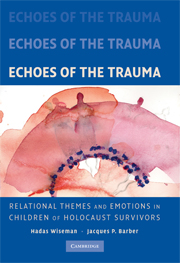Book contents
- Frontmatter
- Contents
- Foreword by Dan Bar-On
- Preface
- Acknowledgments
- 1 Introduction – A Narrative Approach to Bridging the Gap between Clinical Case Studies and Empirical Research on Children of Holocaust Survivors
- 2 Studying Relationship Narratives with the Core Conflictual Relationship Theme Method
- PART ONE RELATIONAL THEMES IN THE NARRATIVES
- PART TWO EMOTIONS IN THE NARRATIVES
- 6 Anger
- 7 Guilt, Shame, and Embarrassment
- 8 Anxiety and Helplessness
- 9 Loneliness
- 10 Joy and Pride
- PART THREE HEALING TRAUMA IN THE CHAIN OF THE GENERATIONS
- Appendix
- References
- Index
6 - Anger
Published online by Cambridge University Press: 29 July 2009
- Frontmatter
- Contents
- Foreword by Dan Bar-On
- Preface
- Acknowledgments
- 1 Introduction – A Narrative Approach to Bridging the Gap between Clinical Case Studies and Empirical Research on Children of Holocaust Survivors
- 2 Studying Relationship Narratives with the Core Conflictual Relationship Theme Method
- PART ONE RELATIONAL THEMES IN THE NARRATIVES
- PART TWO EMOTIONS IN THE NARRATIVES
- 6 Anger
- 7 Guilt, Shame, and Embarrassment
- 8 Anxiety and Helplessness
- 9 Loneliness
- 10 Joy and Pride
- PART THREE HEALING TRAUMA IN THE CHAIN OF THE GENERATIONS
- Appendix
- References
- Index
Summary
Anger is one of the most common and frequent emotions experienced by human beings (Canary, Spitzberg, & Semic, 1998). Anger may be felt outside social interactions but mostly it is the outcome of troubled interpersonal circumstances (Guerrero & Andersen, 2000). The origins of anger lie in self-protective instincts in the context of interpersonal aggression. People become angry when others insult, reject, criticize, or show aggression toward them, or when their relatives come under attack (Andersen & Guerrero, 1998). Even a person faced with an injustice may grow angry (Lazarus, 1991). In most situations, when someone feels anger he or she will try to deal with the injury by responding with anger against another person, which creates an uncomfortable climate for problem-solving and further hinders interpersonal communication (Kiesler, 1996). Being one of the strongest emotions in its impact, anger may cause damage and present interpersonal danger (Guerrero & Andersen, 2000). Anger may put a person at risk if he or she expresses it, and this may cause him or her to conceal it, consciously or unconsciously, or even direct it at a different person who constitutes no threat. Nevertheless, being able to express anger calmly, rather than inhibiting it or resorting to aggression, is an important relational skill (Guerrero, 1994).
Studies on sons and daughters of Holocaust survivors have documented the difficulties in the expression of anger and the regulation of aggression in this group. Clinical reports have suggested that survivors' children were overvalued and overprotected by their parents (Jucovy, 1992).
- Type
- Chapter
- Information
- Echoes of the TraumaRelational Themes and Emotions in Children of Holocaust Survivors, pp. 97 - 117Publisher: Cambridge University PressPrint publication year: 2008



